EN

October 2025
Four and a half decades after their debut, GNR are still going strong, proving that rock music does not age badly after all. Agenda Porto spoke with Rui Reininho, Tóli César Machado, and Jorge Romão.
GNR (Grupo Novo Rock) has released 12 original albums, four compilations, two live albums and played hundreds and hundreds of concerts. The Portuguese band, which has released songs that have spanned generations and become part of the collective imagination (who doesn't know the lyrics to Dunas by heart?), is celebrating its 45th anniversary with concerts at the Coliseu do Porto and Coliseu de Lisboa.
At a time when it was unusual for pop rock bands to perform in coliseums, GNR were one of the first to do so – on 24 April 1987, at the Coliseu dos Recreios, and then on 11 November 1989, at the Coliseu do Porto. Four decades later, they will perform at the Coliseu do Porto on 18 and 19 October and at the Coliseu dos Recreios on 6 and 7 November (with dates already sold out). Operação STOP – Somos Todos Obrigados a reParar (Operation STOP – We Are All Obliged to Repair) serves as the motto for the four shows, which are guaranteed to feature songs such as + Vale Nunca, Efectivamente, Vídeo Maria, Pronúncia do Norte and Sangue Oculto.
Mais vale nunca mais crescer [better never grow up again]
The Coliseu Porto Ageas is the venue chosen for the conversation with Agenda Porto. Of the three ‘GNRs’, Rui Reininho is the first to arrive, in good spirits. The septuagenarian, who refuses to be weighed down by his age, is full of high spirits (we thought he would appreciate the pun, an art in which he is a master) and takes the opportunity to confirm that the plaque honouring the band's 30-year career at the Coliseu do Porto is still on display in the foyer (‘some people wanted to take it down’). This is a milestone year for the musician: 70 years of life (‘I tried to let the date pass unnoticed, but I couldn't’) and 45 years of GNR's career to be celebrated in coliseums.
"We were the first of that pop rock generation to come here to the Coliseu and conquer this space. It was a bit closed off, it was difficult. Brazilian artists came; at the time, the Buarques, [Caetano] Veloso... Only Tantra [from Lisbon], in the 1970s, performed at the Coliseu dos Recreios. But there was a very long hiatus in which it was really a bit of a kamikaze thing, because it was practically our own production,‘ explains Reininho. ’At that time, there was no ticket control; you didn't know if people were going to show up or not," he adds, referring to the uncertainty that bands had to deal with.
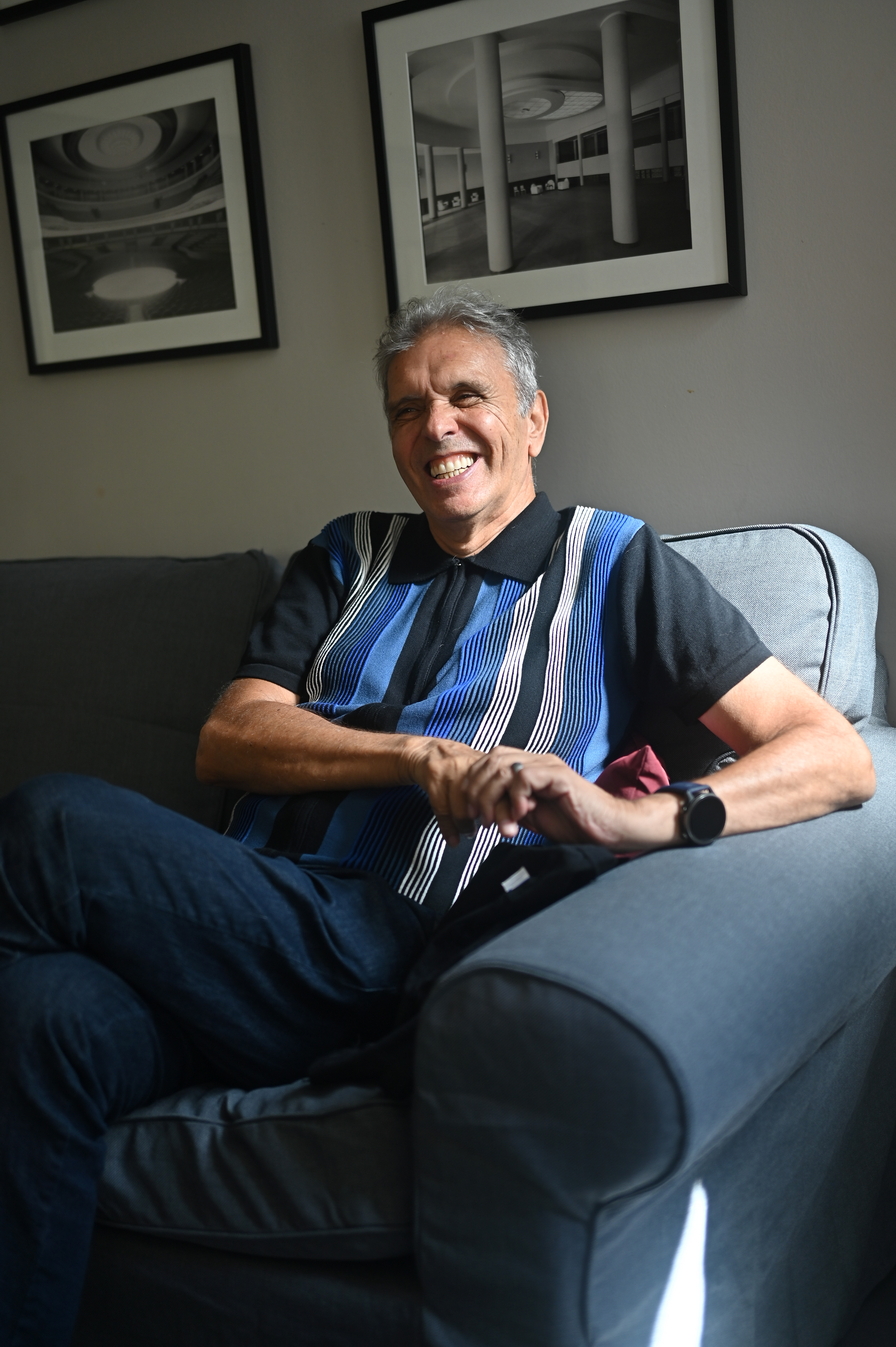
Rui Reininho em entrevista à Agenda Porto © Rui Meireles
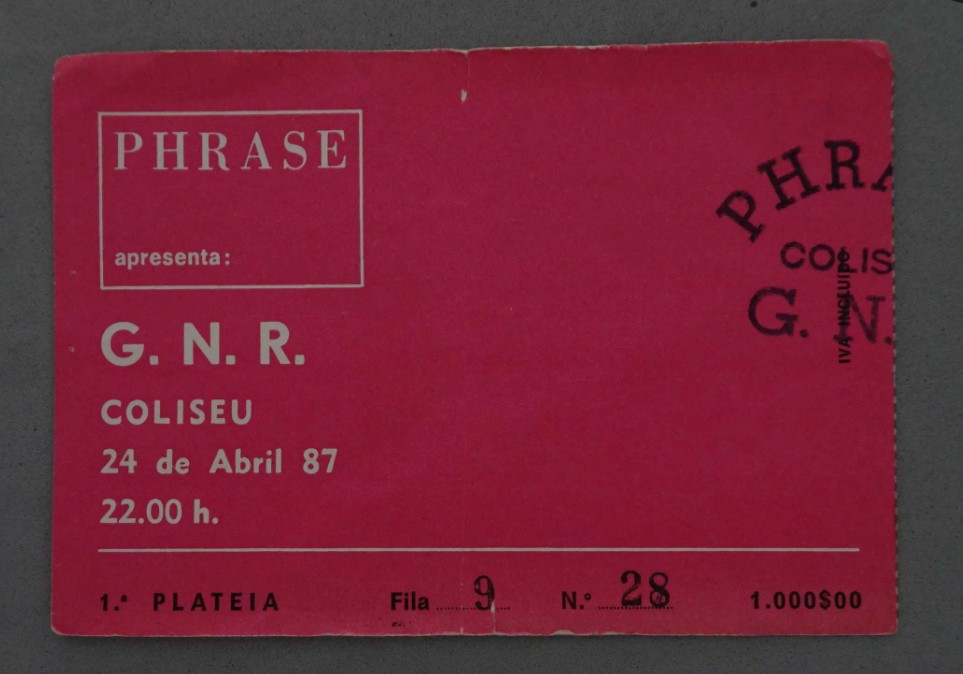
Bilhete do concerto de GNR, em 1987, no Coliseu dos Recreios © DR
Aparentemente sem moralizar [apparently without moralising]
Regarding the concert at Recreios, Tóli César Machado, who joins the conversation with Agenda Porto later, says that ‘it was very important’ for the band, ‘as important as the Alvalade Stadium’, lamenting that it was viewed by the press ‘as a normal concert’, thus contradicting the public's response to what would come to be considered a historic milestone in Portuguese music.
‘It wasn't a big deal; curiously, and without any hard feelings, we didn't have that support from the press and radio,’ Reininho interjects. "We took the Mareantes do Rio Douro; they went by bus and came back. That's what was important!" concludes Jorge Romão, laughing, who has also joined the conversation.
The band made their debut at the Coliseu do Porto on 11 November 1989, to a full house. Tickets sold out two days before, but continued to be sold at the door. In Onde nem a Beladona cresce, the authorised biography of GNR, which marks the band's 35th anniversary, we read that tickets were sold on the black market for a thousand escudos each.
"For us, it was a surprise when someone told us “there's a queue there on R. de Passos Manuel, it's already sold out for one night!” - and there were huge crowds down there. You could only buy tickets at the box office; people queued up to buy tickets. There was no such thing as online, there was no control whatsoever. Without wanting to make comparisons, but in Alvalade it was the same thing," Reininho recalls to Agenda Porto.
Ai, ui, atirem-me água benta [Oh dear, throw holy water at me]
The lead singer refers to another highlight of the band's career: the concert on October 10th of 1992, when they sold out the José de Alvalade stadium. If, at the time, performing in coliseums was an adventure, the biggest adventure was performing in a football stadium, and GNR were the first Portuguese band to do so.
"I remember we arrived on a Wednesday, and the show was going to be on Saturday, and we had no idea how many tickets had been sold. It was curious that the editor said, “Rui, you're going to have to break a leg; it looks like only three or four thousand tickets have been sold”. In a stadium, that's a flop, isn't it? And in the end, there were more than 40,000 people. We had no idea; it was only when we went to the physical locations to pick up the tickets [that we saw the queues]. For us, it was like an adventure, it was almost like a daily betting contest," he laughs.
Incidentally, he recalls those days when it was them, the musicians, who ‘did everything’ (‘it was tout fait à la main, as the English say,’ he quips), including putting up promotional posters: "We took care of all these things; I remember putting up posters with my father's car, and he got furious because I got glue all over the boot (laughs). It was all more or less illegal, there were no council licences, and we filled the Rotunda da Boavista with GNR live posters. And then we went to eat a francesinha.”
When asked about the moment he realised that GNR were not just a band but had become a landmark in Portuguese music, Reininho points to ‘perhaps the first international appearances’ in 1986. ‘We started here in Galicia, then we found ourselves in France, at Printemps de Bourges, which was an important festival; Madrid, Barcelona, and we thought this is our life now, it's not just playing for our girlfriends and friends in the garage, and we're all going to finish our courses and then do something more.’
Bem-vindo ao passado [Welcome to the Past]
The concerts at the coliseums marking the band's 45th anniversary promise trips down memory lane, but ‘without nostalgia’. GNR will show that there are songs that do not age; in fact, they improve with age. ‘Fortunately, the songs have evolved a little within the realm of possibility, within their recognisable structure, but they have taken quite a few turns, and what also has a big influence is the presence of other musicians. In this case, I think the line-up is strong [Samuel Palitos on drums and Ben Monteiro on guitar and keyboards],’ says Reininho.
And despite being a mature band, they will prove on stage that you can age well. The format of the concert ‘will be a bit longer.’ ‘The repertoire will be extended, I think it will be around two hours.’ But he warns: ‘In my case, you can't expect me to be like Uncle Jagger, running and jumping from the boxes,’ he laughs.
With a repertoire of a hundred and fifty songs, Reininho admits that ‘some were abandoned and others never made it [live] because they didn't work; they were made with recording in mind.’ ‘For concerts, we kept the ones we felt people liked to hear; it has to do with the audience's reaction,’ adds Romão.
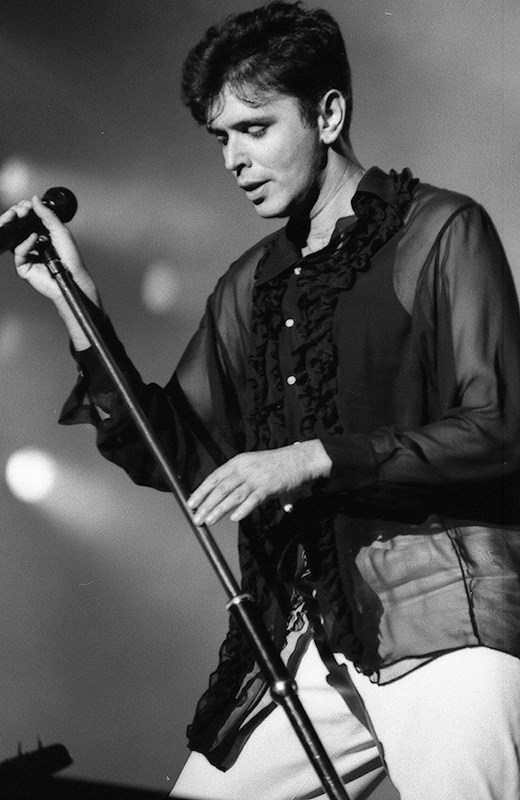
Reininho, em 1992, no Estádio de Alvalade © Rui de Campos
Fonte: Imagem retirada da página de Facebook dos GNR
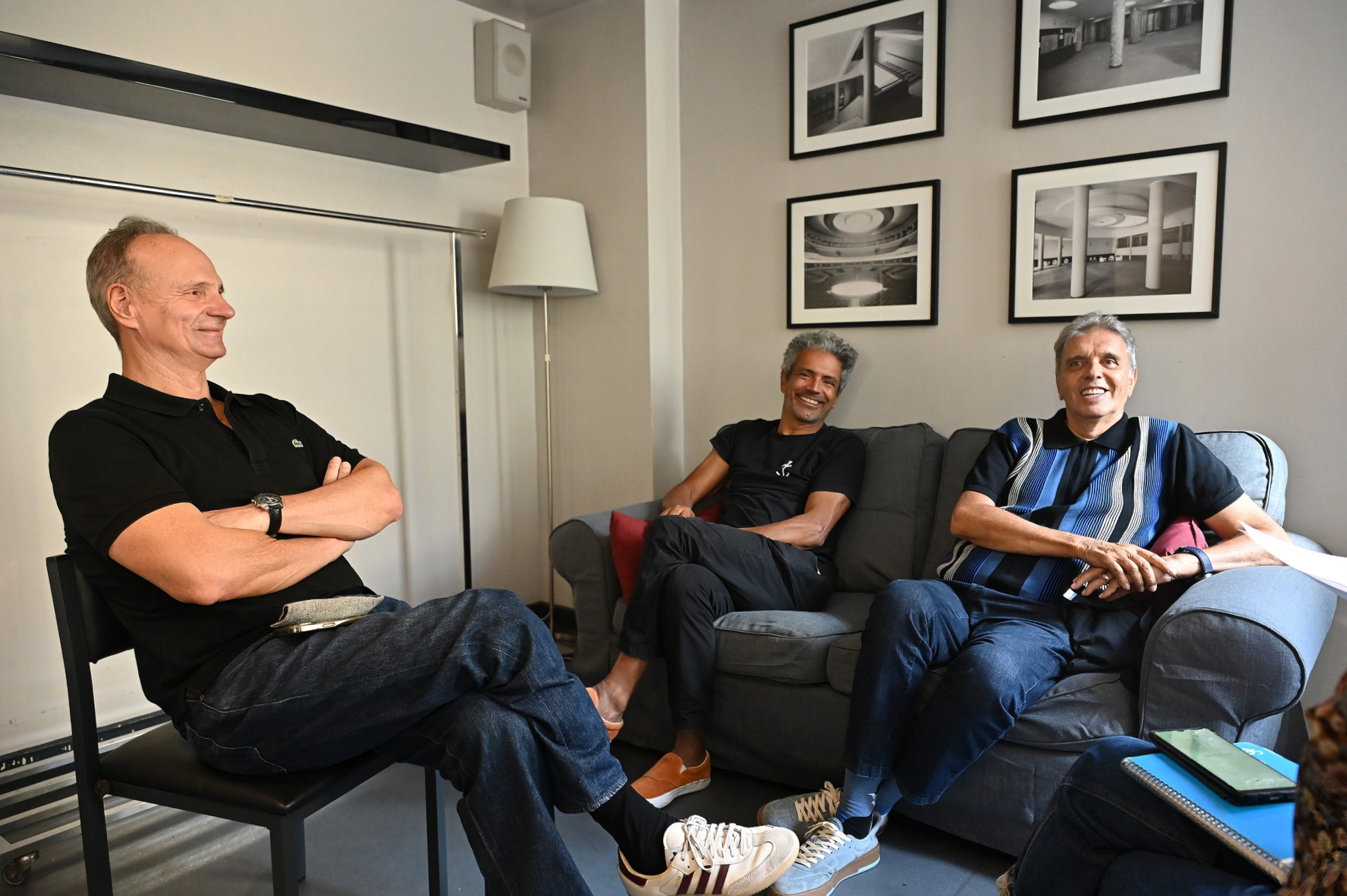
© Rui Meireles
Meio-dia não sejas triste [midday, don't be sad]
Reininho assures us that the selection of songs for live performances ‘never came from a marketing campaign’. He recalls: "When we made the compilation Câmara Lenta, I remember the record label saying that we had to do a tour with only “slow songs”, a more intimate show and so on, more for the ladies, and we ended up not doing it. We didn't want to do it. We're too restless."
When asked about the concerts they would repeat if they could, the vocalist and bassist agree that they would redo the ones that went badly ‘to do better’. ‘We remember the bad things more than the good things; we like to do things well,’ says Romão.
"I remember half a dozen that went really badly for various reasons – almost always for technical reasons; one in Bombarral; another in Viseu, at the Feira de São Mateus, where the electricity kept going down. It's very frustrating, and it happened a lot; the land itself didn't have enough power. I think it was in Ferreira do Alentejo that boom! Everything went down, and the electrician had gone to a funeral," recalls Reininho.
Throughout their career, the band has travelled the length and breadth of the country and, as a result, ‘sees more of Portugal than even the politicians.’ "We enter the localities in a more courageous way. We saw Trás-os-Montes being abandoned. We're on the road. We would go to Bragança and say goodbye to our families, like, goodbye, see you when I get back, because it was hard to get there. It's still hard today."
É como saltar a fogueira [it's like jumping over the bonfire]
The musician argues that, at concerts, ‘it is important for people to feel supported in their motivations wherever they go.’ ‘Being bland and sterile is no fun at all.’ Incidentally, he says he ‘likes to mess with everyone.’ ‘Even saying “good evening, Oliveira de Azeméis!” when we're in São João da Madeira - and people booing; or being in Braga and saying “Bye, Guimarães!”’, he laughs.
When asked what keeps them on stage, Reininho says ‘it's the habit of getting nervous’ and Jorge assures us that ‘it's the joy of playing live that drives the band.’ But doesn't an artist ever retire, we insist. Tóli is categorical: ‘No.’ ‘Those who run for pleasure never tire. I've never seen this as an obligation; and when we don't play live, something is missing.’
Looking back on the band's career, the founder and composer of GNR admits that ‘I would have done some things differently, but overall, everything went well.’ The proof of this is that they are here celebrating 45 years.
We ask if the stage is now more a place of liberation or responsibility, or even responsible freedom. Reininho agrees: ‘That's very well put: “responsible freedom” is a good definition.’ ‘Controlled madness,’ they laugh. That's what the audience can expect at the concerts on 18 and 19 October. Spoiler alert: at the end, everyone will sing Dunas in unison.
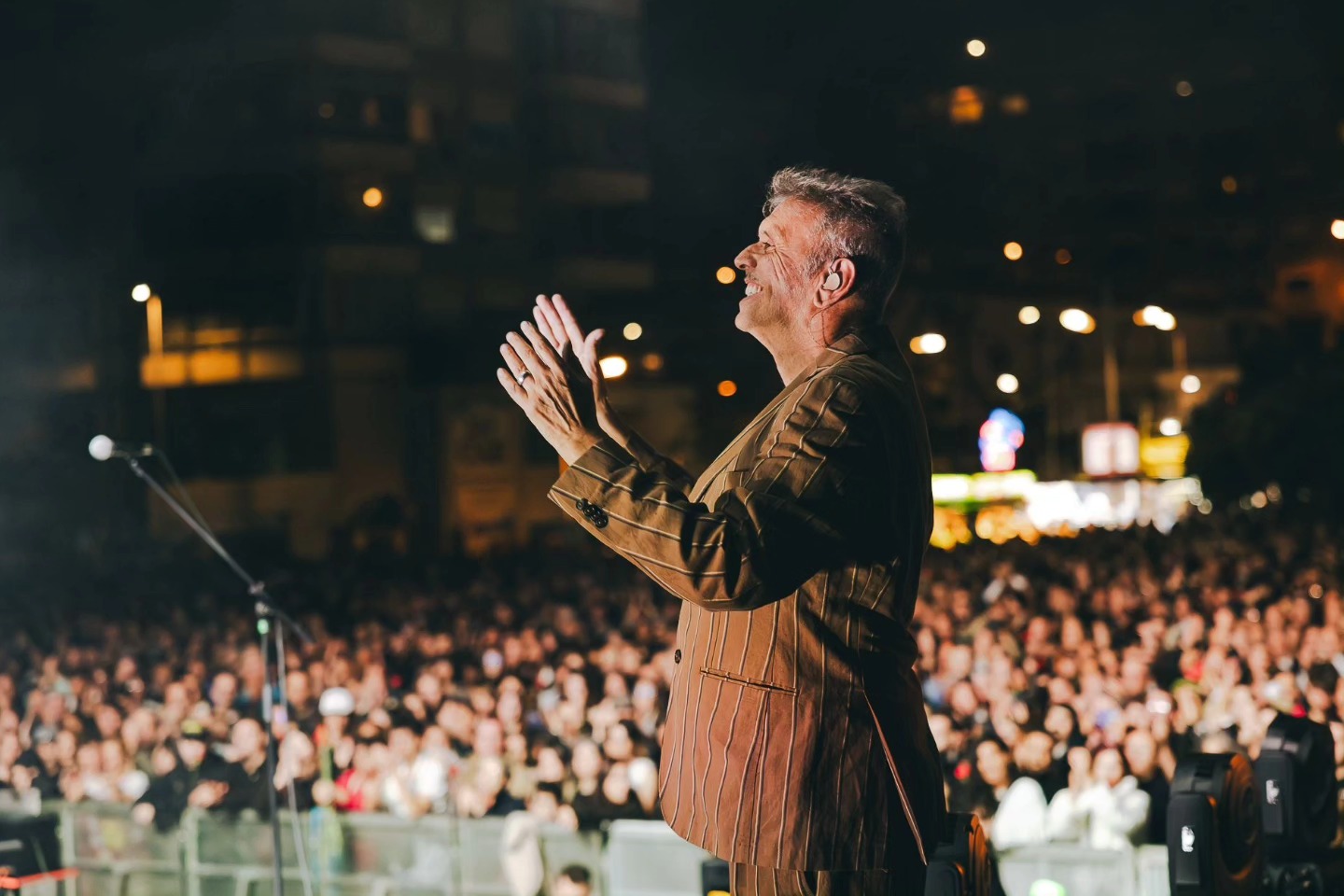
Reininho em palco © DR
Fonte: Imagem retirada da página de Facebook dos GNR
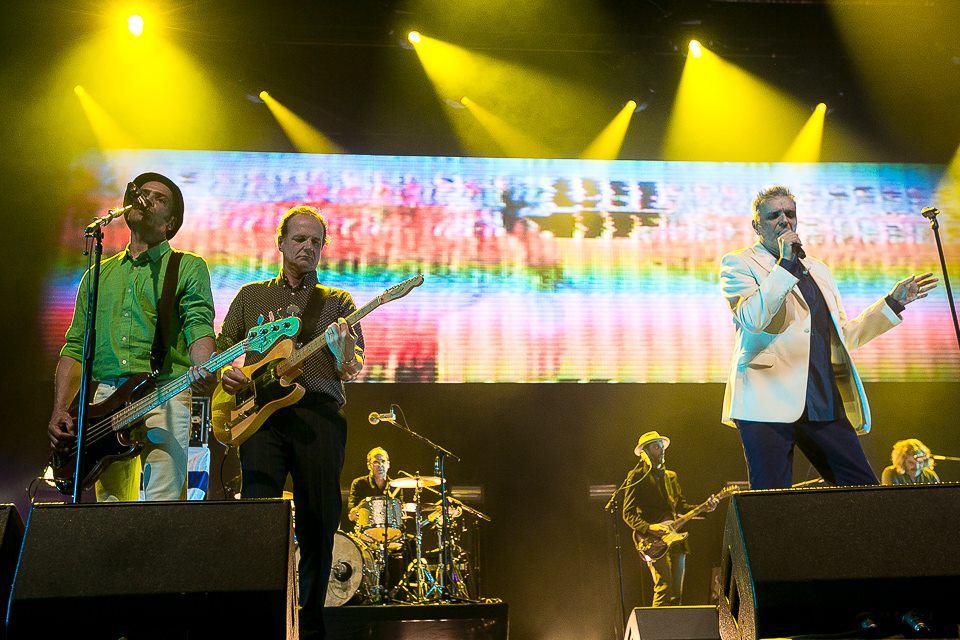
GNR no Coliseu do Porto em 2017 © DR
Fonte: Imagem retirada da página de Facebook dos GNR
Share
FB
X
WA
LINK
Relacionados


